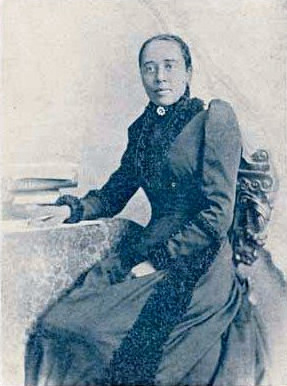Anna Julia Haywood Cooper
Anna Julia Haywood Cooper, Episcopal educator and author, was born on August 10, 1858, in Raleigh, North Carolina. Her mother, Hannah Stanley Haywood, was an enslaved woman and as she refused to discuss the matter, Anna's paternity was never fully determined, however Cooper believed her father to have been her mother's enslaver, Dr. Fabius J. Haywood, Sr., or his brother George.
Cooper began what would be an unusually distinguished academic career at the age of nine, when she enrolled in the newly established St. Augustine's Normal and Collegiate Institute. It was at St. Augustine's that Cooper first embraced the Episcopal faith. By the time she was 11 years old, her math and language abilities had earned her the position of "scholarship-teacher," which paid a stipend of $100 a year in exchange for tutoring other students. Cooper spent 14 years at St. Augustine's, staying on as a matron after she graduated.
In 1877 while still working at St. Augustine's, she married George Cooper, a minister and professor of Greek from Nassau, British West Indies. George died two years later, leaving Anna a widow at the age of 21. She never remarried, but instead devoted her life to academics and the pursuit of social justice. In 1881, she left St. Augustine's and moved north to Ohio, where she attended Oberlin College, one of the first American colleges to admit both African American and white students. Cooper earned her Bachelor of Arts in 1884 and was awarded an honorary Master of Arts in 1887.
Immediately following the receipt of her master's degree, Cooper accepted the post of math and science teacher at Washington High School in Washington, D.C., a prestigious preparatory school for black students. Washington High School was later known as the M Street School, and finally as the Dunbar School. Cooper was to spend the majority of her career at Dunbar. In 1902, she was appointed principal of the school, a position she held until 1906 when she moved to Jefferson, Missouri to teach language at the Lincoln Institute.
In 1910, Cooper returned to the Dunbar School, where she would spend the next twenty years of her career. While teaching Latin at Dunbar, Cooper continued to further her education. She spent the summers of 1911 through 1913 in France, at the Guilde Internationale de Paris, where she studied French history, literature and linguistics. In 1914, Columbia University in New York accepted her as a doctoral candidate. However, to grant the degree, Columbia required a year's residency, which Cooper was unable to fulfill because of her other responsibilities. She transferred to the Sorbonne, where she earned her doctorate at the age of 65.
After retiring from Dunbar School in 1930 at the age of 72, she became president of Frelinghuysen University, an institution offering education for older, employed African Americans as well as vocational and academic training. Cooper was a strong supporter of the Frelinghuysen ideal of self-help; the school was an entirely self-supported African-American enterprise. Cooper herself offered her home as a classroom when the University needed a permanent location, and after her presidency, she stayed for a further ten years as the registrar.
Her life was distinguished by her vocation as an educator and a political, social and community activist. Throughout her life she was concerned with the welfare of women and African Americans, and devoted her energies to writing and speaking extensively on her belief in empowerment through education. She participated in conferences on racial and gender equality and education, including the World's Congress of Representative Women at the Chicago World's Fair in 1893, the Woman Suffrage Congress in 1893, and the Pan-African Conference in London in 1900. She was also the first woman to become a member of the American Negro Academy, an intellectual organization founded by the Rev. Alexander Crummell, an Episcopal priest, to further higher education and racial equality.
Anna Julia Cooper died in her sleep on Feb. 27, 1964 at the age of 105, and was buried next to her husband George.

